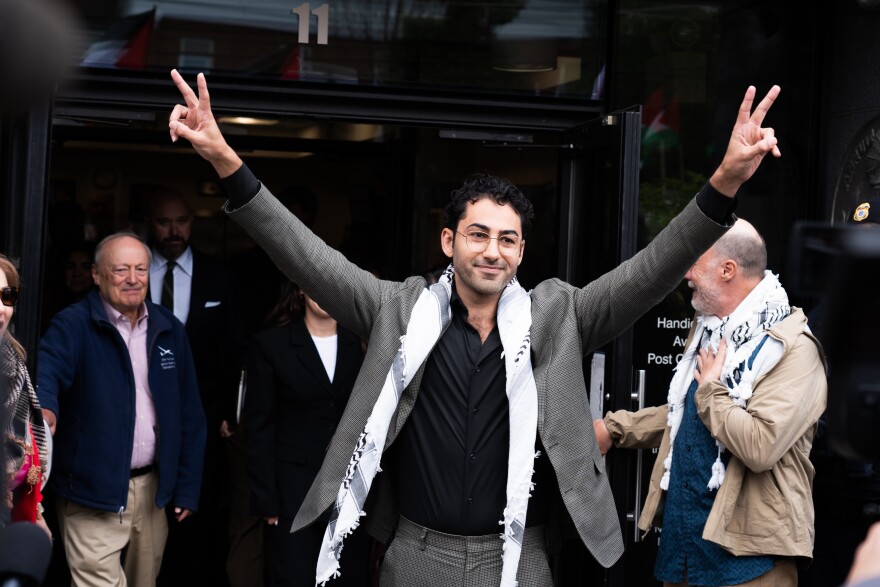A federal judge last week ordered the release of Mohsen Mahdawi, 34, from prison in St. Albans. Mahdawi had been detained by federal immigration authorities two weeks earlier at what he was told would be a naturalization interview in Colchester. The Trump administration has said Mahdawi should be deported because his pro-Palestinian activism threatens its foreign policy goals.
More: Appeals court to hear cases of Mohsen Mahdawi, Rumeysa Ozturk today
Now, Mahdawi is back home in White River Junction, where he’ll continue to work on his immigration case, which is still pending. Mahdawi spoke to Vermont Public’s Sabine Poux on Monday, his first interview with local media since his release from prison.
This interview was produced for the ear. We highly recommend listening to the audio. We’ve also provided a transcript, which has been edited for length and clarity.
Sabine Poux: Mohsen Mahdawi is sitting in the sanctuary of the Universalist Unitarian Congregation of the Upper Valley. It isn’t his first time here. He’s spoken to members of the congregation about his childhood in the West Bank. Now, he’s here to talk about a different experience: his two weeks in a Vermont prison.
Mohsen Mahdawi: You might laugh at this, I realized that the cell that I was staying in is not that much different from my cabin.
Sabine Poux: That cabin is Mahdawi’s cabin in West Fairlee.
Mohsen Mahdawi: The cabin is only 1 foot wider and 4 feet longer than the cell. So I started imagining every time I go back in the cell, I’m getting into my cabin.
More from Vermont Public: Mohsen Mahdawi released from prison while immigration proceedings continue
Sabine Poux: That time also made him think about the West Bank. Mahdawi says when the guard would shine a light into his window at night, he thought about all the men in his family who he says were held in prison back home.
Mohsen Mahdawi: I was not, when I was in the West Bank. Now I understand the feeling of my uncle, my father, my cousins and my grandfather. And I am now a third generation, looking at the ceiling of the bunk bed with all of the names that are written there and experiencing the flashlight coming through the darkness at night.
Sabine Poux: Mahdawi’s lived in Vermont for about a decade. He’s finishing up school at Columbia University this spring, and plans to start a master's degree there in international relations this fall. But even when he’s in New York, he calls the Upper Valley home.
Sabine Poux: Does anything about Vermont, or the Upper Valley specifically, remind you of the West Bank, remind you of home?
Mohsen Mahdawi: Everything actually reminds me of home. The kindness of the people here remind me of home. The freedom that I have here, that I never had at home, the freedom of traveling, the freedom of going on a hike without worrying that I would run into soldiers or into settlers who would attack me reminds me of home. Feeling safe just sleeping into my place without thinking that somebody’s going to break into my house and the army coming, arresting me or parts of my family remind me of home. It’s yin and yang — by having this love and this safety, it reminds me of what I didn’t have back home.
Sabine Poux: Do you still feel safe here?
Mohsen Mahdawi: You know, there was this period where my safety was in jeopardy. To a certain level, there is still a level of risk. And that’s the period where I went into sheltering in place. Because I was worried and concerned that I would be kidnapped or detained by ICE. But seeing the people in the Upper Valley and seeing the community and Vermont, marching in the street and chanting for justice and freedom and coming to the prison to protest and in front of the court — I feel safe.

Sabine Poux: Mahdawi says he’s seen friends every night since he was released. I asked if he’s been able to talk to his family, too.
Mohsen Mahdawi: I have not had the opportunity. You know, when your life becomes dedicated to a greater cause, when your life is no longer your personal life, that is the transformation that I went through after being released from the prison. So I had one phone call with my father. He started crying and he said, "I told you, I told you. Step away and don’t do this stuff. But we’re proud of you." So we didn’t have the chance to speak, but I asked my sister to translate a longer reflection that I wrote about my experience in prison, to translate it and read it to my father so he can feel and understand that we are connected through experience.
Sabine Poux: Is that how you feel, that your life is now dedicated to this greater cause?
Mohsen Mahdawi: I’ve always felt this way. I’ve always felt this way. But now I am feeling that now I am fully stepping into this destiny, this path.
Sabine Poux: Now that he’s fully on this path — a path, he says, of alleviating pain and suffering for Palestinian children — Mahdawi has taken [on] a different tone. He’s not sheltering in place anymore, like he was before his arrest. Right after his hearing, he stood outside the courtroom and addressed the Trump administration, saying he wasn’t afraid.
Mohsen Mahdawi: When I shared that, "I am not afraid of you" to President Trump and his cabinet, because I realized that this is a war between love and fear. I wanted to send the message that if we are rooted in our belief, and if we are connected with each other, we should not fear anybody. We’re fighting for a right cause, for democracy in this country, for justice in Palestine and for our humanity.
Sabine Poux: Are there moments when your hope and faith and love waver and you feel scared or angry?
Mohsen Mahdawi: I'm thinking about it, and to be quite honest with you, I cannot remember any moment that I felt I am about to give up on the idea, or I am in despair, or I am being shaken. I'm very rooted in this, in this feeling — the inevitability of justice.
Mahdawi says he plans on walking at graduation at Columbia University in two weeks. He says he wants to send a message of hope.





